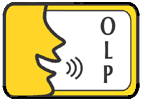| Part. No |
Participant
Short Name |
Participant role |
Contact |
| 1 |
ILSP |
The involvement of ILSP includes financial and administrative coordination,
speech processing for the Greek language, and interface design and development.
In addition, ILSP maintains a project web page and is responsible for
contacting, co-ordinating and providing technical support to Greek user organisations.
|
Athanassios Protopapas |
| 2 |
USFD |
The main role of the Speech and Hearing Research Group in Computer Science (SpandH)
is to lead the development of OPTACIA and contribute to the development of GRIFOS
and other aspects of software development. The School of Health and Related Research
(SCHARR) will concentrate on defining therapy schedules, advising on speech technology
design and leading the test trial activities.
|
Phil Green
Pam Enderby |
| 3 |
KTH |
KTH coordinates content design and collection for the OLP therapy tool, including
defining user groups and designing the therapy schedules for each user group.
KTH also coordinates collection and organisation of the disordered speech database,
contributes to academic and professional dissemination and to speech technology applications,
and will apply and evaluate OLP for
the Swedish language in their local setting focussing on deaf children.
|
David House
Anne-Marie Öster |
| 4 |
UPM |
UPM leads the development of Speech Recognition tools (GRIFOS) and with interface
this block with the text-to-speech packages. The speech processing will render
information about the pronunciation quality of the users.
|
Ramón García |
| 5 |
ARCHES |
The primary responsibility of ARCHES within OLP concerns the assessment and evaluation
of the work developed within the project, as well as a substantial contribution to
management and co-ordination activities. ARCHES also has a key role in the
dissemination activities and contributes to the definition of a number of specifications
during the initial phase of the project.
|
Jean-Paul Lefevre |
| 6 |
ALTEC |
ALTEC is responsible for the IT developments of the generic functionality parts
and the migration of the application to an Internet environment.
ALTEC will aim to channel the developments towards exploitation on the basis of
utilising the concept of Application Service Providers (ASPs) serving as the basis
supporting remote speech therapy sessions using E-Commerce-like approaches and practices.
|
Adamantios Koumbis |
| 7 |
Logos |
Logos is responsible for the definition of user groups, their speech profiles
and speech-therapy needs in Greek, leading to the development of appropriate speech databases
and training schedules, exercises, and guiding materials; and for testing the OLP system
to determine its efficacy, to provide directions for improvement, and to build a knowledge
base for extending to other cases and for guiding professionals in its use.
|
Athanassios Xofillis |
| 8 |
BDGH |
BDGH contributes to the definition of user groups, their speech profiles and speech-therapy
needs in English, leading to the development of appropriate speech databases and training schedules,
exercises, and guidance materials; advises on the design of the speech technology;
and will test the OLP system to determine the system?s efficacy and to provide directions
for system improvement.
|
Mark Hawley |
